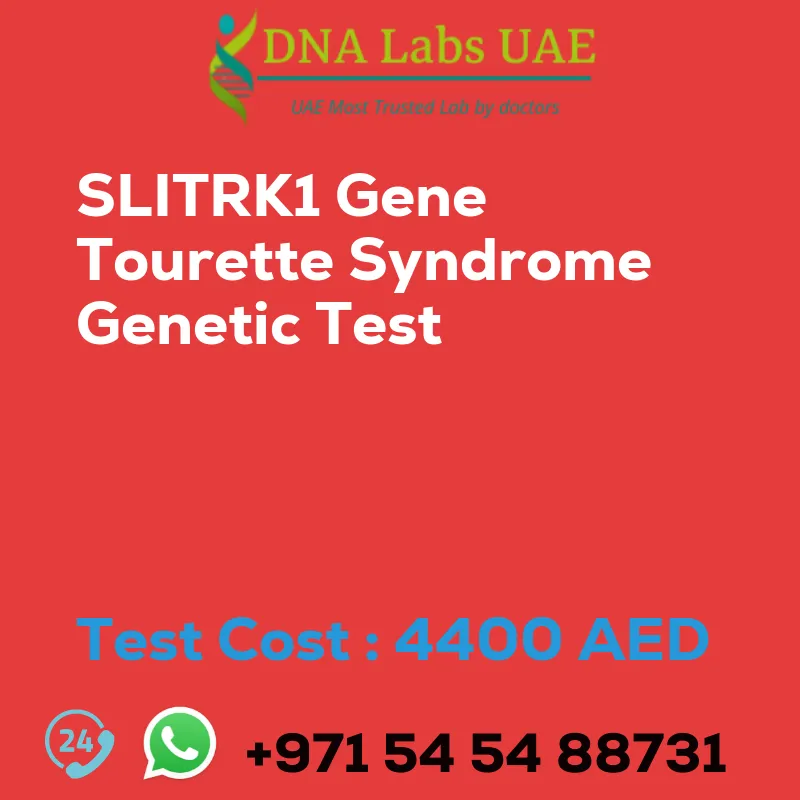SLITRK1 Gene Tourette Syndrome Genetic Test
Test Name: SLITRK1 Gene Tourette Syndrome Genetic Test
Components: Blood or Extracted DNA or One drop Blood on FTA Card
Price: 4400.0 AED
Sample Condition: Blood or Extracted DNA or One drop Blood on FTA Card
Report Delivery: 3 to 4 Weeks
Method: NGS Technology
Test Type: Neurological Disorders
Doctor: Neurologist
Test Department: Genetics
Pre Test Information: Clinical History of Patient who is going for SLITRK1 Gene Tourette Syndrome NGS Genetic DNA Test. A Genetic Counselling session to draw a pedigree chart of family members affected with SLITRK1 Gene Tourette Syndrome.
Test Details
The SLITRK1 gene is associated with Tourette Syndrome, a neurological disorder characterized by repetitive, involuntary movements and vocalizations called tics. NGS (Next-Generation Sequencing) genetic testing refers to a type of genetic testing that uses advanced sequencing technologies to analyze multiple genes simultaneously, providing a comprehensive view of an individual’s genetic makeup.
The SLITRK1 gene is one of several genes that have been identified as potentially playing a role in the development of Tourette Syndrome. NGS genetic testing can help identify variations or mutations in the SLITRK1 gene that may be associated with an increased risk of developing Tourette Syndrome.
By analyzing the entire SLITRK1 gene, NGS testing can provide more detailed information about specific variations or mutations that may be present, which can help in the diagnosis and management of Tourette Syndrome. This type of testing can also be used to identify other genes that may be involved in the development of Tourette Syndrome, providing a more comprehensive understanding of the genetic factors contributing to the disorder.
NGS genetic testing for the SLITRK1 gene can be ordered by a healthcare provider and typically involves providing a blood or saliva sample. The sample is then sent to a laboratory where the DNA is extracted and sequenced using NGS technology. The resulting genetic data is then analyzed and interpreted by geneticists or genetic counselors to determine if any variations or mutations in the SLITRK1 gene are present.
It is important to note that while genetic testing can provide valuable information, it is not a definitive diagnostic tool for Tourette Syndrome. Tourette Syndrome is a complex disorder that is thought to be influenced by a combination of genetic and environmental factors. A diagnosis of Tourette Syndrome is typically made based on clinical evaluation and observation of symptoms by a healthcare professional.
| Test Name | SLITRK1 Gene Tourette syndrome Genetic Test |
|---|---|
| Components | |
| Price | 4400.0 AED |
| Sample Condition | Blood or Extracted DNA or One drop Blood on FTA Card o |
| Report Delivery | 3 to 4 Weeks |
| Method | NGS Technology |
| Test type | Neurological Disorders |
| Doctor | Neurologist |
| Test Department: | Genetics |
| Pre Test Information | Clinical History of Patient who is going for SLITRK1 Gene Tourette syndrome NGS Genetic DNA Test A Genetic Counselling session to draw a pedigree chart of family members affected with SLITRK1 Gene Tourette syndrome |
| Test Details |
The SLITRK1 gene is associated with Tourette syndrome, a neurological disorder characterized by repetitive, involuntary movements and vocalizations called tics. NGS (Next-Generation Sequencing) genetic testing refers to a type of genetic testing that uses advanced sequencing technologies to analyze multiple genes simultaneously, providing a comprehensive view of an individual’s genetic makeup. The SLITRK1 gene is one of several genes that have been identified as potentially playing a role in the development of Tourette syndrome. NGS genetic testing can help identify variations or mutations in the SLITRK1 gene that may be associated with an increased risk of developing Tourette syndrome. By analyzing the entire SLITRK1 gene, NGS testing can provide more detailed information about specific variations or mutations that may be present, which can help in the diagnosis and management of Tourette syndrome. This type of testing can also be used to identify other genes that may be involved in the development of Tourette syndrome, providing a more comprehensive understanding of the genetic factors contributing to the disorder. NGS genetic testing for the SLITRK1 gene can be ordered by a healthcare provider and typically involves providing a blood or saliva sample. The sample is then sent to a laboratory where the DNA is extracted and sequenced using NGS technology. The resulting genetic data is then analyzed and interpreted by geneticists or genetic counselors to determine if any variations or mutations in the SLITRK1 gene are present. It is important to note that while genetic testing can provide valuable information, it is not a definitive diagnostic tool for Tourette syndrome. Tourette syndrome is a complex disorder that is thought to be influenced by a combination of genetic and environmental factors. A diagnosis of Tourette syndrome is typically made based on clinical evaluation and observation of symptoms by a healthcare professional. |








